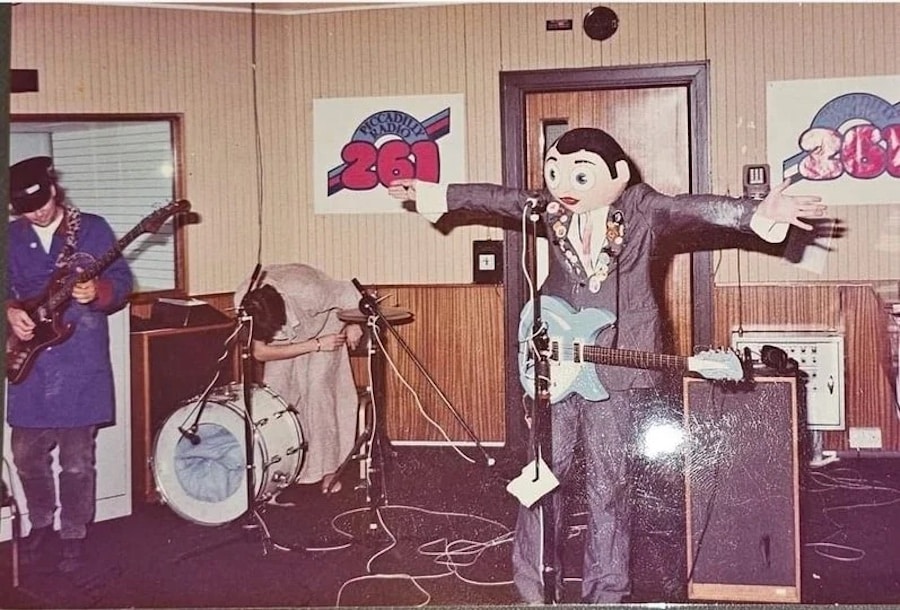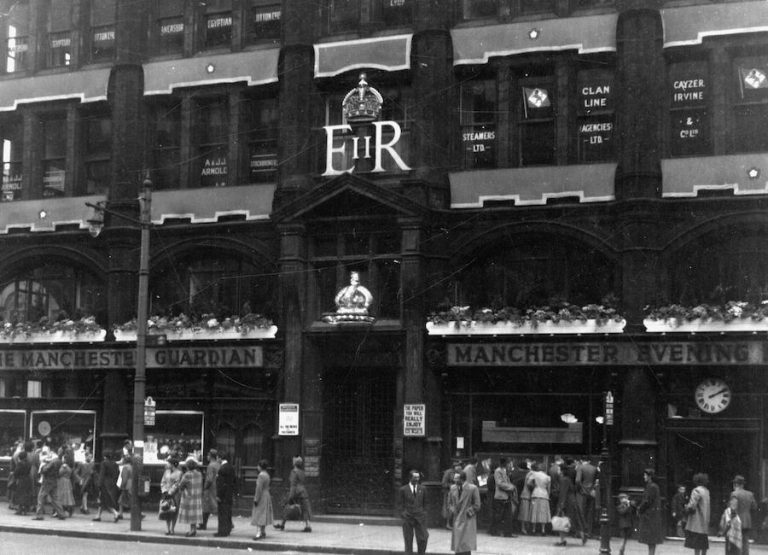Celebrating the legend of Frank Sidebottom
- Written by Thom Bamford
- Last updated 2 months ago
- City of Manchester, Cornerstone, Featured, History, People

Forget the usual suspects—when it comes to Manchester icons, none are as delightfully bizarre as Frank Sidebottom, the quirky character with a giant papier-mâché head and a knack for turning the ordinary into the extraordinary.
But for those in the know, Frank Sidebottom is as synonymous with the city as its football teams and music legends. Beneath the comically oversized head was Chris Sievey, a creative force who turned a quirky alter ego into a beloved cult phenomenon.
Let’s dive into the whimsical world of Frank Sidebottom and celebrate the magic he brought to Timperley, Manchester, and beyond.
The humble beginnings of Frank Sidebottom

Chris Sievey grew up in Sale, a suburb of Manchester. In the early ’70s, he dreamed of musical stardom, hitchhiking to London and staging sit-ins at Apple Records, hoping to meet The Beatles.
While he didn’t land a record deal, he did meet Ringo Starr, and his musical aspirations endured. In the late ’70s and early ’80s, Chris formed The Freshies, a band that saw moderate success with tracks like “I’m in Love With the Girl on the Manchester Virgin Megastore Checkout Desk.”
You can check that out here:
Unfortunately, a cancelled appearance on Top of the Pops meant Chris’s music career never quite took off.
enter Frank Sidebottom
The Frank Sidebottom character first appeared in 1984 on an untitled EP by Chris Sievey & the Freshies, featuring a quirky spoken-word track where Frank directly converses with Sievey. The character quickly became iconic, instantly recognisable by his large, spheroidal papier-mâché head, which later evolved into fibreglass. This surreal head, styled similarly to early Max Fleischer cartoons, became Frank’s defining feature.
Dressed in a sharp 1950s-style suit, Frank was portrayed as a 35-year-old aspiring pop star living in the small village of Timperley, near Altrincham, where he would often make humorous references to his mother, who was supposedly oblivious to his growing fame. Frank’s character was eternally optimistic, always enthusiastic, and blissfully unaware of his own shortcomings—traits that endeared him to audiences.
Chris Sievey’s creation of Frank was a calculated move to launch his music career in a novel, comedic direction. In an attempt to break into showbiz, Sievey recorded a playful cover of Madonna’s “Material Boy” under the Frank character, sending it out to major record labels along with a note that read, “I’m thinking of getting into showbiz. Do you have any pamphlets?” EMI showed interest and even offered him an interview, where Sievey appeared in full Frank attire, securing a deal with their sub-label Regal Zonophone.
In 1985, Frank released his third EP, Frank’s Sidebottom’s Firm Favourites, which entered the UK charts at number 97 before quickly dropping. His earlier self-released EPs, Frank’s Summer Special and an early version of Firm Favourites, set the stage for his first commercial releases. His second EP, Oh Blimey, It’s Christmas, charted slightly higher, peaking at number 87, but similarly faded from the charts. Despite the limited commercial success of his releases, Frank had already developed a cult following in the North of England, particularly in Manchester and London, and was able to attract large crowds at his gigs.
His shows were an eccentric mix of stand-up comedy, musical performance, and audience participation. Frank often included novelty elements such as a tombola and bizarre lectures. Unlike the more alternative comedians of the time, Frank’s comedy was family-friendly and always in good spirits, which allowed him to appeal to a wide demographic. His performances helped him become a regular fixture on TV, appearing on programs like No. 73 and its spin-off 7T3.
Frank also had a popular comic strip in the children’s weekly magazine Oink! in 1986, and his backing band, “The Oh Blimey Big Band,” featured former Freshies members Mike Doherty (drums) and Rick Sarko (guitar), along with later additions such as Jon Ronson (keyboards).
In 1987, Frank released his first spoken-word album, Fantastic Tales, through his own label, 11:37. The following year, he released his first full musical album, 5:9:88, on the In Tape label, which introduced the character of Mrs. Merton, later popularised by Caroline Aherne. Though this shift led to some tension between Chris and his band, Aherne’s success with Mrs. Merton didn’t detract from Frank’s charm, with the band members acknowledging her ability to craft her own unique persona.
The late ’80s and early ’90s were peak years for Frank Sidebottom, who became a beloved regional figure. His success was tied to the Madchester music scene, where his popularity intersected with the rise of bands like The Stone Roses and Happy Mondays. He made frequent appearances on Granada TV, including as a reporter for the regional news program Granada Reports.
In 1989, after a brief reformation of his band, Frank embarked on a 30-date tour with a new lineup, which ended in disappointment as the revamped sound failed to resonate with fans. This led Sievey to perform solo once again, a shift that ultimately worked in Frank’s favour, maintaining his charm and popularity as a solo act.
Frank continued to thrive on TV, landing his own show Frank Sidebottom’s Fantastic Shed Show in 1992. He also appeared on Channel 4’s What’s Up Doc?, where he portrayed Frank and introduced the recurring segment Life with the Amoebas. After two series, Sievey left the show, but Frank remained an enduring cultural figure.
Despite the minimal commercial success, Frank Sidebottom’s wit, charm, and quirkiness made him a household name in the North and a beloved cult figure.
The man behind the mask
Chris and Frank were two sides of the same coin. While Frank was exuberant and childlike, Chris was reserved and introspective. Steve Sullivan, the director of Being Frank: The Chris Sievey Story, spent seven years delving into the dichotomy of Chris and Frank.
“Frank was in-your-face and crazy, while Chris was a quiet, creative genius, ”Steve noted.
Chris’s ability to find magic in the ordinary was extraordinary. He reimagined Timperley as a fantastical place where even the local post office was noteworthy for its “left-handed” and “right-handed” post boxes. This playful approach resonated deeply with fans, turning Frank’s whimsical world into a cultural touchstone.
Frank’s hiatus and revival
The mid-’90s were challenging for Chris, marked by personal struggles, financial difficulties, and a hiatus for Frank. However, by 2005, Frank was back. With his infectious humour and offbeat performances, he re-entered the public eye.
From festival gigs to appearances on Channel M’s Proper Telly Show in B/W, Frank was busier than ever, this time with a sidekick—Little Frank, a ventriloquist’s dummy made of cardboard. The pair’s dynamic, punctuated by Frank’s exclamations of “He’s only cardboard!”, became an iconic part of his act.
Chris’s creativity extended beyond Frank. An accomplished artist and animator, he even worked on the beloved children’s series Pingu. Despite his wide-ranging talents, Chris often lamented that he was only known for Frank. As Steve Sullivan observed, “Chris wanted people to see him as an artist separate from Frank. But most couldn’t, and that bothered him.”
“The loveable oddity”
The loveable oddity of Frank Sidebottom lives on in stories and anecdotes. One of the most touching moments from Steve’s documentary involved Chris’s son, Harry. During a family separation, Harry had asked for just one Christmas gift: “You.” Chris delivered by wrapping himself in paper and standing in the living room, cigarette in hand, ready to be unwrapped.
Chris passed away in 2010 at the age of 54, leaving behind a legacy of laughter, music, and surrealism.
Fans rallied to ensure he wouldn’t have a pauper’s funeral, raising over £21,000 in a single day. A statue of Frank Sidebottom now stands proudly in Timperley, showing his enduring charm the love he inspired.
Frank Sidebottom’s place in culture
Frank Sidebottom was a celebration of eccentricity and imagination. His influence extended beyond Manchester, inspiring artists, musicians, and filmmakers. The 2014 film Frank, starring Michael Fassbender and loosely inspired by Chris’s life, brought Frank’s story to an international audience. While fictionalised, it captured the essence of Chris’s world: the triumphs, the struggles, and the joy of being unapologetically different.
Forever fantastic
Over a decade since Chris’s passing, Frank Sidebottom remains a beloved figure in British pop culture. His songs, humour, and unique perspective on life continue to bring smiles to faces across generations. Frank taught us that magic exists in the mundane and that it’s okay to embrace our quirks.
So, next time you’re in Timperley, stop by Frank’s statue and snap a photo. You might even imagine Frank himself popping out from behind a bush with a hearty “Thank you very much!” After all, as Chris Sievey proved, the extraordinary is never far away if you’re willing to see it.
- This article was last updated 2 months ago.
- It was first published on 21 January 2025 and is subject to be updated from time to time. Please refresh or return to see the latest version.
Did we miss something? Let us know: [email protected]
Want to be the first to receive all the latest news stories, what’s on and events from the heart of Manchester? Sign up here.
Manchester is a successful city, but many people suffer. I Love Manchester helps raise awareness and funds to help improve the lives and prospects of people across Greater Manchester – and we can’t do it without your help. So please support us with what you can so we can continue to spread the love. Thank you in advance!
An email you’ll love. Subscribe to our newsletter to get the latest news stories delivered direct to your inbox.
Got a story worth sharing?
What’s the story? We are all ears when it comes to positive news and inspiring stories. You can send story ideas to [email protected]
While we can’t guarantee to publish everything, we will always consider any enquiry or idea that promotes:
- Independent new openings
- Human interest
- Not-for-profit organisations
- Community Interest Companies (CiCs) and projects
- Charities and charitable initiatives
- Affordability and offers saving people over 20%
For anything else, don’t hesitate to get in touch with us about advertorials (from £350+VAT) and advertising opportunities: [email protected]

How The Salutation became a cornerstone of Manchester’s story

Ukranian artist studying in Manchester shares inspiring message about living life to the full



How Manchester’s turbulent past shaped a global icon of journalism
















